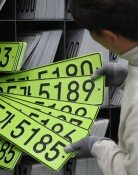Korean researchers develop new skin sensing sound and pressure
Korean researchers develop new skin sensing sound and pressure
Posted April. 04, 2017 07:07,
Updated April. 04, 2017 07:14
An electronic skin that detects changes in pressure and sound has developed. The electronic skin is more sensitive than actual human skin. Hence, it is expected to be used in various areas such as disaster phenomena and diagnostic robot.
A research team led by Professor Kim Do-hwan of Organic Materials and Fiber Engineering Department at Soongsil University and Professor Jeong Hee-tae at the Korea Advanced Institute of Science and Technology (KAIST) announced on Monday that the team developed a super sensitive skin that mimics how humans feel the touch. This electronic skin can detect waves of changing sounds as well as pressure that amounts to hundreds of tons of rock.
The researchers created the electronic skin by applying piezoelectric elements to thermoplastics that stretch as temperature changes. The power generation capacity of piezoelectric elements changes along with pressure. The sensing channels inside the plastics were formed only by external mechanical stimulus. This is the same principle of sensing pressure by decoding electric signals generated with ionic liquid. Also, the new skin is flexible and can be stretched as actual human skin.
Electronic skin that is highly sensitive to low pressure of less than 1kPa has been developed several times. However, it is the first time that an electronic skin whose sensitiveness can be measured in various ways is developed.
"The electronic skin can be used as a base technology of smart interface that detects surroundings and sends precise information in real time," Professor Kim said. For instance, it can be employed to smart robots that sense patients’ state of health, surgical robots with precise sensitivity, and rescue robots for disaster sites. The research team’s paper has been selected as the cover story of international scientific journal "Advanced Materials" issued on April 4.
yskwon@donga.com
Headline News
- N. Korea launches cyberattacks on S. Korea's defense companies
- Major university hospital professors consider a day off each week
- Italy suffers from fiscal deficits from ‘Super Bonus’ scheme
- Inter Milan secures 20th Serie A title, surpassing AC Milan
- Ruling and opposition prioritize spending amid tax revenue shortfalls







